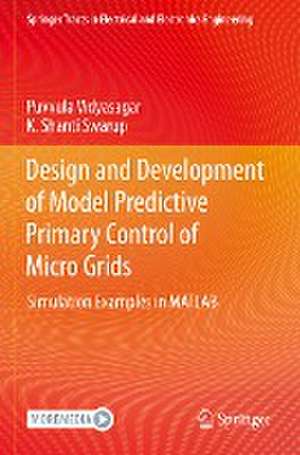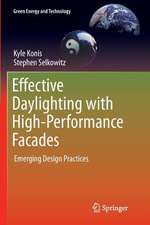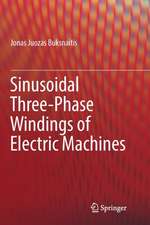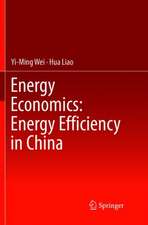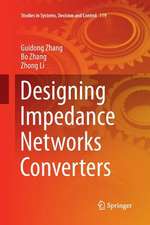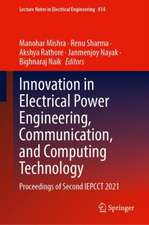Design and Development of Model Predictive Primary Control of Micro Grids: Simulation Examples in MATLAB: Springer Tracts in Electrical and Electronics Engineering
Autor Puvvula Vidyasagar, K. Shanti Swarupen Limba Engleză Paperback – 3 ian 2024
| Toate formatele și edițiile | Preț | Express |
|---|---|---|
| Paperback (1) | 775.65 lei 6-8 săpt. | |
| Springer Nature Singapore – 3 ian 2024 | 775.65 lei 6-8 săpt. | |
| Hardback (1) | 781.45 lei 6-8 săpt. | |
| Springer Nature Singapore – 2 ian 2023 | 781.45 lei 6-8 săpt. |
Din seria Springer Tracts in Electrical and Electronics Engineering
- 20%
 Preț: 565.33 lei
Preț: 565.33 lei - 20%
 Preț: 1040.32 lei
Preț: 1040.32 lei - 18%
 Preț: 1006.55 lei
Preț: 1006.55 lei - 20%
 Preț: 1051.00 lei
Preț: 1051.00 lei - 18%
 Preț: 901.57 lei
Preț: 901.57 lei - 18%
 Preț: 1006.55 lei
Preț: 1006.55 lei - 18%
 Preț: 890.54 lei
Preț: 890.54 lei - 18%
 Preț: 952.89 lei
Preț: 952.89 lei - 5%
 Preț: 1171.59 lei
Preț: 1171.59 lei - 18%
 Preț: 954.45 lei
Preț: 954.45 lei - 18%
 Preț: 888.18 lei
Preț: 888.18 lei - 18%
 Preț: 1106.00 lei
Preț: 1106.00 lei - 18%
 Preț: 1002.31 lei
Preț: 1002.31 lei - 18%
 Preț: 893.40 lei
Preț: 893.40 lei -
 Preț: 308.47 lei
Preț: 308.47 lei - 18%
 Preț: 785.86 lei
Preț: 785.86 lei - 18%
 Preț: 889.92 lei
Preț: 889.92 lei - 15%
 Preț: 584.43 lei
Preț: 584.43 lei - 20%
 Preț: 1047.88 lei
Preț: 1047.88 lei - 18%
 Preț: 1220.88 lei
Preț: 1220.88 lei - 18%
 Preț: 778.45 lei
Preț: 778.45 lei
Preț: 775.65 lei
Preț vechi: 945.90 lei
-18% Nou
Puncte Express: 1163
Preț estimativ în valută:
148.44€ • 154.40$ • 122.55£
148.44€ • 154.40$ • 122.55£
Carte tipărită la comandă
Livrare economică 14-28 aprilie
Preluare comenzi: 021 569.72.76
Specificații
ISBN-13: 9789811958540
ISBN-10: 9811958548
Ilustrații: XVIII, 158 p. 56 illus., 20 illus. in color.
Dimensiuni: 155 x 235 mm
Greutate: 0.26 kg
Ediția:1st ed. 2023
Editura: Springer Nature Singapore
Colecția Springer
Seria Springer Tracts in Electrical and Electronics Engineering
Locul publicării:Singapore, Singapore
ISBN-10: 9811958548
Ilustrații: XVIII, 158 p. 56 illus., 20 illus. in color.
Dimensiuni: 155 x 235 mm
Greutate: 0.26 kg
Ediția:1st ed. 2023
Editura: Springer Nature Singapore
Colecția Springer
Seria Springer Tracts in Electrical and Electronics Engineering
Locul publicării:Singapore, Singapore
Cuprins
Chapter 1. Micro-grid Introduction and Overview.- Chapter 2. An Overview of Micro-grid Control.- Chapter 3. Mathematical Modelling of a Micro-grid.- Chapter 4. Introduction to Model Predictive Control.- Chapter 5. LTI-MPC for the Micro-grid Control.- Chapter 6. LTV-MPC with Extended “TAIL”.- Chapter 7. Special functions in the MPC formulation.- Chapter 8. Auxiliary Requirements for Real-time Implementation.- Chapter 9. Conclusion and Future Scope.
Notă biografică
Puvvula S R V R S S Vidyasagar completed his Ph.D. from Indian Institute of Technology (IIT) Madras. He completed his M.Tech. from National Institute of Technology (NIT) Calicut and B.Tech degree from RVR&JC Engineering College, India. His research interests are power systems, renewable energy, photovoltaics, smart grids, renewable energy technologies, and power systems modeling. He has several research papers in journals and conferences published to his credit. K. Shanti Swarup is a faculty with the Department of Electrical Engineering, Indian Institute of Technology (IIT) Madras, India. Before joining the department as a visiting faculty member, he held positions at the Mitsubishi Electric Corporation, Osaka, Japan, and Kitami Institute of Technology, Hokkaido, Japan, serving as a visiting research scientist and visiting professor, respectively, from 1992to 1999. Since 2000, he has been a professor at IIT Madras. His research areas include power systems, smart grids, artificial intelligence, knowledge-based systems, computational intelligence, soft computing, Energy Management Systems (EMS), Supervisory Control and Data Acquisition (SCADA), power system automation, and network protection. He has done research projects with various industries like BHEL, Hitachi, Easun-MR, etc.
Textul de pe ultima copertă
This book provides a design and development perspective MPC for micro-grid control, emphasizing step-by-step conversion of a nonlinear MPC to linear MPC preserving critical aspects of nonlinear MPC. The book discusses centralized and decentralized MPC control algorithms for a generic modern-day micro-grid consisting of vital essential constituents. It starts with the nonlinear MPC formulation for micro-grids. It also moves towards the linear time-invariant and linear time-variant approximations of the MPC for micro-grid control. The contents also discuss how the application of orthonormal special functions can improve computational complexity of MPC algorithms. It also highlights various auxiliary requirements like state estimator, disturbance compensator for robustness, selective harmonic eliminator for eliminating harmonics in the micro-grid, etc. These additional requirements are crucial for the successful online implementation of the MPC. In the end, the book shows how a well-designed MPC is superior in performance compared to the conventional micro-grid primary controllers discussed above. The key topics discussed in this book include – the detailed modeling of micro-grid components; operational modes in micro-grid and their control objectives; conventional micro-grid primary controllers; the importance of MPC as a micro-grid primary controller; understanding of MPC operation; nonlinear MPC formulation; linear approximations of MPC; application of special functions in the MPC formulation; and other online requirements for the MPC implementation. The examples in the book are available both from a calculation point of view and as MATLAB codes. This helps the students get acquainted with the subject first and then allows them to implement the subject they learn in software for further understanding and research.
Caracteristici
Deals with the modeling and simulation of microgrids (MGs) for integration with renewable energy Includes information in the form of illustrations, block diagrams, flow charts, graphs, tables Addresses the fundamental aspects of modeling from the Linear time-variant and time-invariant approaches
